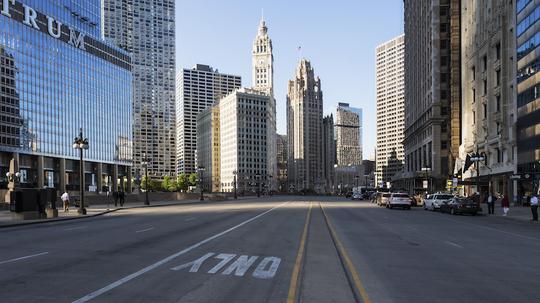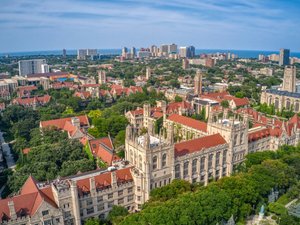
At a City Council meeting last August, where Chicago officials were discussing the future of driverless cars in the city, Alderman Edward M. Burke showed a clip from the film “Back to the Future.”
Burke said he was trying to illustrate the potential dangers of driverless vehicles, drawing parallels from the film, in which Doc Brown invents a DeLorean sports car time machine, and suggesting that the cars could be used as weapons.
Burke (14th) and fellow Chicago Alderman Anthony A. Beale (9th), have both publicly expressed their resistance to testing driverless vehicles on Chicago roads. The Aldermen argue that the city’s streets should not be used as an experiment for autonomous vehicles, and over the summer, Chicago’s City Council proposed a ban on computer-driven cars, but it was later scrapped because of legislation the state government was passing.
The "Back to the Future" stunt, and the City Council's general uneasiness around driverless cars, comes as autonomous vehicles are being tested today on roads across the U.S.
States like California, New York, Massachusetts, Nevada, Florida, Pennsylvania and Arizona, along with nearby Midwestern states like Michigan and Ohio, are all testing driverless cars. Uber and Ford Motor Company have started testing autonomous vehicles in Pittsburgh and Phoenix, and Lyft began giving rides in Boston in nuTonomy’s self-driving electric Renault vehicles. Automakers and tech companies are pushing hard to get autonomous cars on the roads, with General Motors expected to launch a driverless ride-hailing fleet in cities by 2019.
Meanwhile, not a single autonomous vehicle has been tested in Illinois to the state's knowledge, according to Gianna Urgo, public information officer at the Illinois Department of Transportation.
With autonomous vehicles quickly approaching, Chicago and Illinois lawmakers have done little to prepare for a driverless future. When it comes to driverless cars, it seems the Second City isn't even on the map.
Innovation Around the Country
With Illinois' reluctance to pass legislation that supports autonomous innovation, experts say Chicago could miss out on opportunities to attract new businesses, entrepreneurs, and as a result, jobs. In fact, one autonomous vehicle company even backed out of plans to expand to Chicago in favor of opening an office in a more driverless car-friendly state.
In early 2017, Navya, a Lyon, France-based startup that makes fully electric and autonomous shuttles, announced plans to open its first U.S. office in Chicago. But later in the year, the company reversed course, deciding it would instead put its headquarters in Saline, Mich., because of the state’s favorable regulations for autonomous vehicles, and because it was near Ann Arbor, where major autonomous vehicle innovation is taking place, the company told Chicago Inno.
Ann Arbor is home to Mcity, a 32-acre park of urban-like streets and highways, complete with traffic signals, where nearby automakers in Detroit can study and test their autonomous vehicles. Several car manufacturers, including Ford, GM and Toyota, have tested their vehicles there.
In Detroit, Waymo, the autonomous car-maker that sprung from Google’s self-driving car project, announced in October plans to set up a new testing center as a way to test its cars in snow and sleet, and on slippery roads.
And southeast Michigan isn’t the only place in the Midwest where autonomous innovation is thriving.
Columbus, Ohio, is home to the Transportation Research Center, which is the largest independent vehicle testing organization in the Americas. Its location allows for vehicle testing in a variety of conditions and seasons.
And in New York, Gov. Andrew Cuomo announced this fall that GM and Cruise Automation are applying to begin testing fully autonomous vehicles in the state early this year. They will be testing in Manhattan, where geo-fenced mapping has begun. Though the vehicles will have fully autonomous capabilities, there will be a driver and passenger in each car at all times.
"Autonomous vehicles actually drive much safer than humans."
Most opposition to new technology stems from fear, and Chicago officials aren’t the only ones wary of autonomous tech. A recent AAA study found that 78 percent of those polled feared autonomous cars. However, data suggests that driverless vehicles could actually make roads much safer, considering that 94 percent of accidents are caused by human error, according to the U.S. Department of Transportation.
Root Insurance, a mobile-only car insure-tech startup, based in Columbus, is the first company to give discounted insurance rates to drivers who responsibly use autonomous tech in cars equipped with it, particularly because data shows that autonomous tech eliminates human error, said Root's CEO Alex Timm.
"When a vehicle is in control, you eliminate human error, but then you also eliminate the behaviors that actually cause accidents," Timm said. "Autonomous vehicles actually drive much safer than humans."
Being in Columbus, Timm is familiar with how a city and state can benefit when local governments support autonomous tech innovation. He said that though new technology can be unsettling for some, ignoring it won't make it go away. With the appropriate engineering and monitoring in place, officials can work with their communities to mitigate any associated risks, he added.
"There are certain risks to autonomous vehicles, just like there are risks with all new technologies, but I think to run away from new technologies because of those risks is short-sighted," Timm said. "The city itself will miss out on a lot of growth. To not have these vehicles, and to not be on the forefront of a lot of this technology means you'll have a brain drain—engineers will be leaving. You're really going to miss out on jobs, particularly tech jobs."
Can You Legally Operate a Driverless Car in Illinois?
At the end of August, Gov. Bruce Rauner signed a bill that would prevent local municipalities from banning autonomous cars in Illinois, but it doesn’t go into effect until June 2018. The federal government has adopted the Society of Automotive Engineers' autonomous vehicle classification, which organizes autonomous vehicles into various categories: Those that have no autonomous functions, those that are conditionally-automated, and those that can completely operate on their own without a driver.
Right now, current Illinois law only allows for the testing and driving of conditionally-automated vehicles—cars that require a driver in them—according to Urgo. So, technically, an autonomous vehicle with an operator sitting in the driver's seat could operate today on Illinois roads.
When the new Illinois bill goes into effect, Chicago officials and no other city governments in Illinois will be able to ban autonomous vehicles from driving on roads. However, it is still unclear what the legalities around fully autonomous vehicles, i.e. a car without an operator in the front seat, will be once the bill passes in June.
In an emailed statement to Chicago Inno, Chicago city hall representatives said: “Aldermen held a hearing on the topic and expressed the intention to remain knowledgeable of the concerns that may arise from autonomous vehicles. As a city, we remain open to new technologies and innovations across all industries.”
But some Chicago companies, particularly those in the city's tech ecosystem, aren't waiting for the state to figure out its approach to autonomous innovation. Some are working to drive the city forward now, contributing in any way they can, so they are prepared for when fully-autonomous vehicles are allowed on Illinois streets.
Chicago’s Autonomous Leaders
Out in the Chicago suburb of Burr Ridge, Roman Kuropas is leading Innova EV, a vehicle company he founded in 2012. He makes two versions of his car, the Dash: A highly automated one and a manual one. But both are an electric vehicle that look much like a Smart Car.
The two-seater is 90 inches long, weighs about 1,100 pounds, can get up to 35 mph and travel 150 miles on a single charge. Kuropas is one of the first in Illinois to experiment with autonomous vehicles, but since the state’s regulations around fully autonomous vehicles are still unclear, he’s playing it safe and is opting to test them at Ohio State University in Columbus as part of the Smart City Challenge, a nationwide program that aims to improve transportation.

The car is currently only being tested on campus, but will soon be on Columbus streets, Kuropas said. However, though the cars have fully autonomous capabilities, Innova still keeps a driver in the car who can take over in case something goes wrong.
“As a business, what we’re doing is advancing our automated technology," Kuropas said. "Every mile we’re driving, we’re collecting valuable sensor and lidar data that will provide analytics and insights for us and our partners.”
When it becomes legal to operate fully autonomous vehicles in Illinois, that’s when Innova would begin deploying their autonomous Dash cars on roads with no driver, Kuropas said.
“But I don’t see that happening any time real soon in Illinois and Chicago because there are still too many policymakers that need to decide how they want to approach autonomous mobility,” Kuropas said.
Right now, Kuropas is only operating non-autonomous versions of the Dash in Illinois. In Itasca, the car is transporting Metra commuters to their final destinations, and in the city’s Washington Park neighborhood, Innova has partnered with ComEd to test a ride-sharing program that serves residents of TRC Senior Village. Users can order $3 one-way rides and go to the grocery store, pharmacy and other places around the neighborhood.
In addition to Innova, HERE, a digital mapping company that was previously owned by Nokia, doubled down on its Chicago presence in 2016 as it aimed to make technology that powers autonomous vehicles.
Another local tech company leading the way in the area for autonomous vehicle innovation is Arity, Allstate Insurance’s technology arm. They are using their driver data to help make autonomous vehicles smarter by allowing them to better understand how humans drive and operate on roads.
“We really understand how humans drive,” said Arity CEO Gary Hallgren. “We watch how fast they speed up and how fast they drive down the interstate. And in doing that, there may be ways that we’ll be able to apply some of our knowledge to help cars that drive themselves, drive more like humans.”
In doing this, Arity says it can help improve safety, efficiency and traffic on roads once autonomous vehicles begin driving on them. Hallgren wouldn’t disclose specific companies, but said Arity provides their data to car manufacturers to help them make smarter and more efficient autonomous vehicles.
Arity spokespeople said the organization has also been working with Chicago government officials on autonomous vehicle initiatives, but would not disclose the full details of those meetings.
“Autonomous vehicles will be better drivers than humans,” Hallgren said. “Is there some work to be done in order to improve them? I think there is. But the computers don’t get scared. Computers don’t get tired. Computers are not anxious or upset with the day that they just had. To think that it’s not going to be better is a naïve viewpoint. But you have to get over that element of trust.”
What’s next?
It’s still not clear why Chicago and Illinois have been slower than other areas to test autonomous vehicles. But even if Chicagoans aren’t ready to put driverless cars out on roads right away, there are other ways to contribute to this type of innovation overall, said Brenna Berman, the executive director of City Digital, a Chicago-based infrastructure lab.
She said that Chicago could use its city planning expertise to help set an example for how other cities can re-model their roads to make them more conducive for autonomous vehicles. That means making changes to the zoning and planning of them.
“Autonomous technologies have to change how city planning is done, and that may not be as exciting to people as seeing an autonomous vehicle running around the streets, but city planning is a challenging undertaking, and it’s actually something that the city of Chicago is extremely good at," Berman said.
If one day autonomous, ride-sharing vehicles become the primary mode of transportation, they will simply drop people off at their destination, and won't need to park. The demand for parking lots would significantly shrink, which could result in them being repurposed and consequently, disappearing.
Additionally, roadway infrastructure could change drastically. Right now, they are largely designed to accommodate human error, with wide streets, guardrails, lane markings and signage. But if self-driving tech eliminates human error, the road accessories we are accustomed to now that keep humans driving safely could also disappear, creating more room for pedestrian and bike lanes.
With all of these changes on the horizon, there’s plenty of preparation that goes into a city being ready for the deployment of autonomous technologies, Berman said. City Digital isn’t currently working on a driverless car project with city officials at this point in time, nor do they have concrete plans to do so in the future, but Berman said City Digital hopes to do work with autonomous technology within the next year, even if it’s done independently.
“I do think that Chicago should work with partners to be at the forefront of autonomous technology," Berman said. "But I don’t think that necessarily means piloting driverless cars, which is one small aspect. There’s more than one way to be at the forefront of the advent of autonomous technology."








